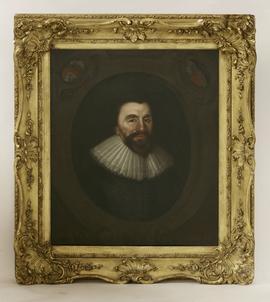Cavendish-Bentinck, William Henry, 1738-1809
- GB-2014-WSA-04595
- Person
- 1738-1809
CAVENDISH-BENTINCK, WILLIAM HENRY, 3RD DUKE OF PORTLAND, elder son of William Bentinck, 2nd Duke of Portland, and Lady Margaret Cavendish Harley, only dau. of Edward Harley, 2nd Earl of Oxford (qv); b. 14 Apr 1738; styled Marquis of Titchfield to 1762; adm. May 1747 (Watts'); left Dec 1754; Christ Church, Oxford, matr. 4 Mar 1755; MA 1 Feb 1757; DCL 7 Oct 1792; LLD Tinity Coll. Dublin 18 May 1782; assumed additional surname of Cavendish 1755; MP Weobley 1761 - 1 May 1762; succ. father as 3rd Duke of Portland 1 May 1762; Lord Chamberlain 15 Jul 1765 - 26 Nov 1766; Privy Councillor 10 Jul 1765; Lord Lieut., Ireland, 10 Apr - 15 Sep 1782; Prime Minister and First Lord of the Treasury 21 Apr - 19 Dec 1783; although previously a committed Whig politician, he became alarmed by the French Revolution and joined William Pitt’s government in 1794; Secretary of State for Home Affairs, 11 Jul 1794 - 30 Jul 1801, Lord President of the Council 30 Jul 1801 - 14 Jan 1805; KG 16 Jul 1801; Prime Ministry and First Lord of the Treasury 31 Mar 1807 - 28 Sep 1809, when he resigned through ill-health; Chancellor of Oxford University from 27 Sep 1792; Lord Lieut., Nottinghamshire, from 19 Jun 1795; FRS 5 Jun 1766; a Busby Trustee from 14 Mar 1765; m. 8 Nov 1766 Lady Dorothy Cavendish, only dau. of William Cavendish, 4th Duke of Devonshire PC KG; d. 30 Oct 1809. DNB.

